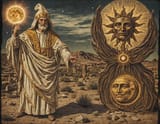>>17937708
>In any case, Saturn’s dreams are known from various sources, including treatise 10 of the Corpus Hermeticum. We also have other Indo-European and paradigmatic examples of dreams of gods with performative power. Saturn’s little naps, during which he reveals the laws of the universe to those who pass by, remind us of the Hindu Vishnu, who creates the world simply by dreaming about it, as revealed in the Puranas dedicated to the same god
>To return to Mithras, the birth of gods and their relatives out of a rock or mountain is well known in Asia Minor. After all, both humans and gods who venture into these parts are still stardust. And from dust to dust, as the Christians say
>As for Mithraism, we have the following passage from Pseudo-Plutarch, which is instructive both for what it says and for what it implies:
>"Near to this river lies the mountain Diorphus, so called from Diorphus, the son of the earth, of whom this story is told. Mithras, desirous to have a son, yet hating woman-kind, lay with a stone, till he heated it to that degree that the stone grew large, and at the prefixed time was delivered of a son, called Diorphus; who, growing up and contending with Mars for courage and stoutness, was by him slain, and by the providence of the gods was transformed into the mountain which was called Diorphus by his name." — Pseudo-Plutarch. De fluviis
>Walter Burkert shows us that this passage has its origins in the Hittite myth of Ullikummi, in which Kumarbi impregnates a rock from which Ullikummi, a diorite giant, is born. According to Robert Turcan and Mastrocinque himself, the Mesopotamian sun god Shamash was depicted, along with other Anatolian gods, rising from a mountain
4chan Search
1 results for "8d429e9647a27788045beb08a66f9deb"
